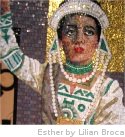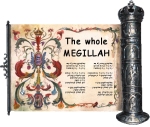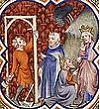|
|
|||||||||||||||||||||
 |
|||||||||||||||||||||
|
Learn Hebrew |
|||||||||||||||||||||
|
|
||||||||||||
|
The Hebrew word for "scroll" is megillah (מְגִלָּה). In conversational English, however, the term "the whole Megillah" has come to mean a long, involved story told in great detail... Though this connotation might be appropriate regarding matters that are tedious to hear (such as listening to an insurance salesman's pitch), if you've ever read or heard the story of Queen Esther in Megillat Esther (the Scroll of Esther), you know that it's anything but a droning tale. No, in this fascinating megillah there's plenty of action, romance, intrigue, suspense, danger, and delicious irony. Best of all, the "whole megillah" gives us great reason to celebrate God's providential care for His people -- and that of course includes God's care for you and me, too! Much is made over the fact that the book of Esther is the only book of the Tanakh that does not explicitly mention the Name of God. However, the idea of God's sovereignty and hashgachah (divine providence) is clearly implied throughout the entire story. In light of this nes nistar, or "hidden miracle" of the Jew's deliverance, Esther and Mordecai ordained that Purim should be observed as a "day of feasting and merrymaking" and of sending gifts to the poor (Esther 9:22,28). By the way, Purim was so named because Haman had cast lots (purim) to determine the day on which to destroy the Jews. Yeshua spoke of that insatiable lust within the unregenerate heart that leads to violence, oppression, and slavery of every kind: You know that those who are considered rulers of the Gentiles lord it over them, and their great ones exercise authority over them. But it shall not be so among you. But whoever would be great among you must be your servant, and whoever would be first among you must be slave of all. For even the Son of Man came not to be served but to serve, and to give his life as a ransom for many. (Mark 10:42-45) This might sound counterintuitive to those who have been indoctrinated into believing that a lifestyle of self-centered fulfillment, power, and carnal pleasure are the goals of life, but Yeshua turns the world's logic on its head by affirming that true greatness is not to found in the eyes of others but solely in the humble acknowledgment of our eternal indebtedness to God for everything. It is the servant, the slave, "the nonentity" who is considered great in God's kingdom. Mankind's lust for power and greatness is nothing but the ridiculous donning of a tinfoil crown. In anticipation of Purim, then, let me wish you and your family Purim Sameach -- with the prayer that you will stand true to your faith, despite this wicked world and its syncretizing influences... Hooray for Mordecai! -- may the LORD raise up many like him! And may Haman and his kind forever be foiled in their attempts to undermine those who call upon the Name of the LORD God of Israel. Amen. |
|
Hebrew for Christians |
|||||
|
|||||



